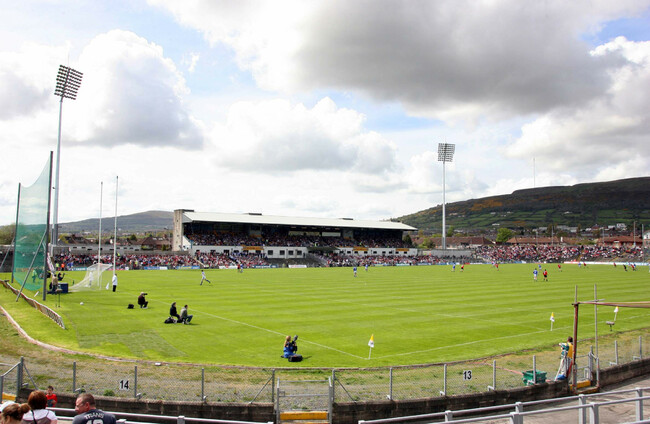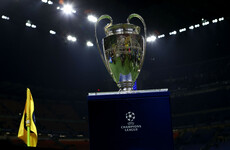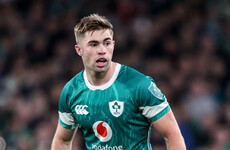ATROCITIES WERE DEPRESSINGLY commonplace in Belfast in the ’90s, yet the indiscriminate nature, the lack of warning and the time chosen for the 1993 Shankill Road bomb provoked a worldwide reaction of shock and revulsion.
Eight civilians, one UDA member and a Provisional IRA bomber, Thomas Begley, were left dead after a blast at the fishmongers.
A room upstairs from the shop had been under surveillance by the IRA for some time. They believed UDA meetings took place there on Saturdays.
The room above was empty at the time of the explosion on 23 October.
Reprisals came quickly.
In the week that followed, 14 civilians were killed by Loyalists.
It was with that backdrop that the Donegal senior footballers gathered themselves up on that Sunday morning with a coach trip ahead of them.
The fixture was the opening round of the National League, against Derry. It had significant football context.
Derry were All-Ireland champions, unseating Donegal from that role in the Ulster final just a few short months before as an army of frogs emerged through the floods on the Clones Hill.
Somehow, referee Tommy McDermott managed to stage the game, Derry winning 0-8 to 0-6.
Derry would go on to win their sole All-Ireland on the back of that, but there was a little residue left over from some half-whispers and Donegal grumbling that, had the day been dry and conditions different, so too would the outcome.
And here now, they had their chance. The day was fine and mild and the surface was perfect.
Small – no – big problem.
Such was the initial demand to see the game, that it was moved from Derry, to being hosted in Casement Park, Belfast.
Just four miles from the Shankill Road.
An All-Ireland winning year tended to cause havoc with domestic action, so the Derry championship had to go ahead the previous day, featuring Kieran McKeever, Tony Scullion, Henry Downey, Brian McGilligan, Joe Brolly, Seamus Downey and Johnny McGurk.
When McGurk took to the field for the second time in 24 hours, he didn’t even need to sense fear from Donegal. They openly admitted it.
They weren’t used to the massive security operation on the way into Belfast. Seeing helicopters and unfounded fear squeezed some of the air from them.
“I know the Donegal boys were terrified. James McHugh and some of the other players were saying it openly on the pitch that day,” recalls McGurk.
“I know Derry people were a wee bit scared of it, because it had been such an occasion the day before. But we were used to that sort of thing. We were brought up in the Troubles and the Police and the Army would have sat outside our house constantly in Guladuff.
“The presence of Police and Army was nothing new to the Derry players. But I suppose for Donegal it was a shock and a half, especially with some helicopters overheard.”
Semi-paralysed, the game ended up 3-16 to 0-7 in Derry’s favour. The crowd was just over 8,000 with the previously expected large convoy of Donegal support not materialising.
Even such a handsome victory couldn’t be enjoyed in its fullest measure, though Derry manager Eamonn Coleman wore the widest of smiles once it became clear Donegal hadn’t the stomach for it.
“People weren’t giving us credit. They said we beat Donegal on a bad pitch and if it had have happened on a dry day, it would have been a different result,” said McGurk.
“I don’t believe that for a second. That day was set for Derry, it didn’t matter what conditions were like.
“So I would say when we met in Casement, they were there in body, but certainly not there in mind. They were not prepared.
“They probably had an idea they would be facing something when they were heading up the road, but the whole scene when they got up was like something from a horror film for them.”
The sports writer Kieran Cunningham was starting out on his career and freelancing for a number of titles. He had made plans to cover the game, though his workload was barely covering his bus travel and sundry expenses.
His primary motivation was to see an old friend and Naomh Columba team mate, Paddy Hegarty, play for Donegal. Some years later, Paddy told Cunningham that the same day there was a Fleadh Cheoil on at home and he desperately wanted to be there instead, even asking his younger brother Noel if they could skip the game together.
“There was a big rivalry there at the time. You can trace it back to a league quarter-final in 1993 when Tommy Ryan had his jaw broken in a vicious game, so it was no wonder they moved it to Casement Park,” said Cunningham.
“But on the day, Donegal just wanted out of there. Players were looking to pull out themselves. There was always reprisals during that time and anyone in the GAA had been named as legitimate targets.”
One figure who had to have felt extremely vulnerable was the Donegal goalkeeper, Gary Walsh.
From the Aodh Ruadh club in Ballyshannon, he had moved to Warrenpoint, Co Down for work in a meat plant some years before and played his club football with Burren.
“I don’t remember a huge amount about the game, whatsoever,” he says 31 years later.
“I just remember the very surreal atmosphere around the game. It was affecting us all. I would normally have a very good memory for games I played in, all the different things that happen. But that day I don’t recall a thing. Which maybe that speaks volumes; you remember the feeling, the atmosphere.
“I wouldn’t say that I was used to the Troubles or anything but I wasn’t even on the team bus when they were travelling up.
“They came up, played the game and got straight back onto the bus. I drove up by myself and just went back to Warrenpoint. I was well used to checkpoints by then.”
On 26 October, the UDA killed another two Catholic civilians and wounded five at the Council Depot at Kennedy Way, on the fringes of west Belfast.
The spate of attacks reached the lowest point when three UDA members barged into the Rising Son bar in Greysteel where a Hallowe’en party was underway the following weekend. One paramilitary, Stephen Irwin yelled, ‘Trick or treat!’ before the firing started. Eight people were murdered; six Catholics and two Protestants.
Less than a month after the Shankill Road bomb, the Ireland soccer team travelled to Windsor Park to play a crucial World Cup qualifier. Reporters at that game claimed the atmosphere was so feral that had you handed some supporters a gun, they would have used it on an Ireland player.
The following summer, the PIRA announced a ceasefire. That October, the Loyalist Command did the same.
Sometimes, you can’t believe the way it was.














Good piece Declan.
Great read, i remember the day well. I wasnt let go, but the aul fella went. I remember him on about the helicopter above the field during the match. By jez we were glad to see him when he landed home that night. A different time
R